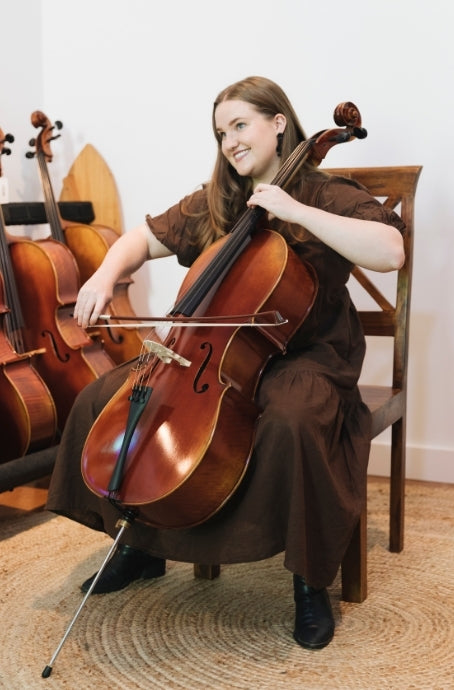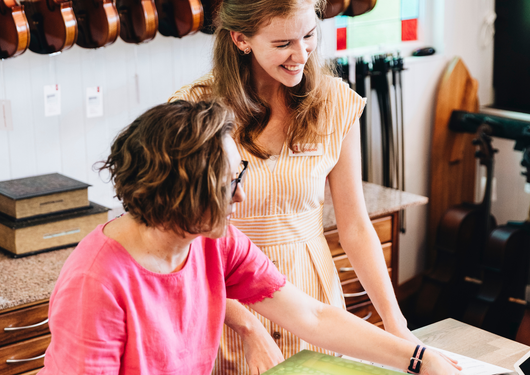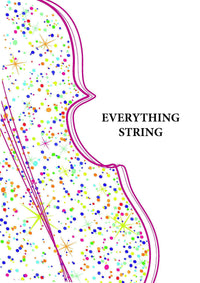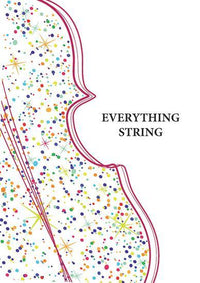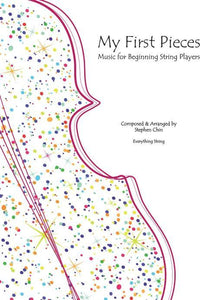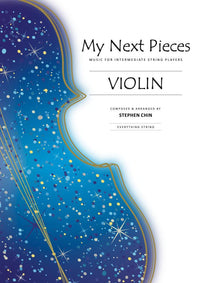Here in Queensland, we are incredibly lucky to be the home of several leading composers and pedagogues. String educators including Stephen Chin, Loreta Fin, Timo Jarvela, Keith Sharp, Anne Svendsen and Neridah Oostenbroek are not only remarkable composers, but they are also regular visitors at our Red Hill store! We’re privileged to support these local composers and teachers, and have had a chat with them over coffee about their compositions, learning methods, and what lies ahead for them in 2024.
In our next interview of the Coffee with Composers series, our Education Manager Jacqui sat down with the incredible Stephen Chin.
Stephen's undergraduate training in both violin and composition were completed at Sydney University under John Harding and renowned Australian composer, Peter Sculthorpe. He also holds a Master of Music degree specialising in performance and pedagogy from Queensland Conservatorium of Music Griffith University, where he has also lectured. Under the banner of Everything String, Stephen has published over 145 string orchestra compositions and arrangements. In 2022, Stephen was awarded the National Award by the Australian Strings Association (AUSTA) in recognition for an outstanding contribution to the string community throughout Australia. This award is given only once every three years. He is currently Principal String Teacher and Director of Orchestras at Brisbane Grammar School.
Thank you for coming in so early and halfway through a big week!
I’m up anyway! I like hearing the birds in the morning, so did Messein! Ha! Straight into composition. I do a lot of writing in the mornings. I also do a little bit of teaching in the mornings, but I’m trying to catch up after 5 weeks in Europe (which was a lot of fun, and I’m going again in 6 months). I was also in Sydney for a week with the Sydney Youth Orchestra. I was one of the original members back in 1973 and they’ve just had their 50th anniversary, so I’m feeling a little bit ancient! It was great to reconnect with my colleagues, and it’s really nice to go back down and conduct these groups, catching up with some really old friends!
It’s such an inspirational experience – I know many people who spent time in the orchestras and now they’re off doing studies overseas! So, if you’ve been squeezing in some writing… Does that mean we have some new compositions in the works for 2024?
I’ve got just a few pieces this year. I’ve done an arrangement of a Haydn Symphony, which is a really fantastic piece. It’s Symphony No. 60 - “Il Distratto”. It’s an overture to an opera as well, which is about a man who is very forgetful, so forgetful that he actually forgets his own wedding day! It’s quite comedic, and you can hear it in the music! It just wafts off into nothing, it’s quite incredible, and then *bang*. The great thing about the piece is that it’s readily playable by a reasonably advanced string orchestra. With Haydn symphonies, most of the ‘interesting’ or melodic ideas are in the first violin part, so I’m going to change it around so the violas and second violins get some melodies too. Share it around a bit, because that’s what we’re all about!
I also have a piece called, “Two Treasures from the Ming Dynasty”, which is super new. Coming out also is “The Cliffs of Moher”. These cliffs are in Ireland. I always have this influence going on because I have Irish heritage as well and I do tend to ‘come home’ to Ireland, musically speaking. So it’s a really sweet little piece: I just imagine myself standing on these huge, high cliffs, and imagine the little bits of rain and sea spray coming up at the start of the piece. Then you see the grandeur of the whole thing… The landscape really inspired this one. As for the Ming Dynasty pieces, I really wanted something at an elementary level which was still artistic and beautiful. The two pieces are called “Lotus” and “Imperial Horses” – both of which were inspired by some really lovely vases with these amazing paintings on them. I like people to be aware of history, of great beauty, and appreciate different cultures and backgrounds.
What about in terms of learning methods? You were working on some more of these when we last had you in-store!
Oh yes… Well, the scale book got massive and it’s a work in progress. It got to 400 pages, so I’m trying to work that down into something more reasonable. I’ve put a bit of a pause on this. I’m hoping to have something that actually works in a studio context and is proven to work over time. I’ve used Flesch scales and similar, and you get to about section 8 and the students are pretty over it. I just think there’s got to be a better way, and these days we’re always battling for people’s time as teachers. Time and attention are key – there are so many distractions nowadays. I have to smack my own left hand for picking up the phone sometimes ! I think, “No! Don’t do that!”. It’s tragic, and I have to be really careful myself. But when I put the effort into focusing on something different, like writing, it’s such a beautiful world to explore and it’s a world you can’t replace. You think about these pieces all day and these distractions become less important.

The catalog you have is phenomenal – you are very prolific and seem to do everything!
Well it’s been some time! I started with “Fiddler’s Ahoy” in 1997, and AUSTA Q approached me and said there was nothing at the Level 1 that was any good. They asked me if I would write a piece, and that was that! Now I’m up to 145 pieces – it’s massive! I just thought, if people like it I’ll just do another one, then they liked that, and another one… There’s a great wealth of composers in Brisbane who write for developing string orchestras, it’s incredible.
It IS incredible. It’s in part what inspired this Coffee With Composers Series. I couldn’t believe how many pedagogues are based here in Brisbane!
We’re all here! There’s some great work going on in other areas of the country, but consistently there’s a few in Brisbane. The good thing about it is that we all get along really well, nobody is worried about egos or competition – we just want to share our music. It’s also really good for the kids to see that we get along – it’s a bigger picture story, that. Because seeing people, musicians and composers, working together is a really valuable lesson that really grounds kids. They pick up on schisms and weird interactions, or if someone’s ignored – it’s partly why Queensland musicians take the world by storm, because we all work together and are kind to work with.
All of you are so multi-talented too – you’re not just composers, you’re also out doing workshops, orchestra sectionals, running major programs – it is so lovely and you’re all so friendly!
It’s a really good part of learning, because we bounce our ideas off each other, and also when you’re out doing workshops and the likes, you can really see what struggles there are, and you see where the gaps are. It’s so informative, even when you’re writing an accompaniment part for a new composition – you know instantly what works and what doesn’t. Things like lining up down bows, or string crossings that are just a bit beyond where the students are in their development. You have to take yourself back to being a beginner. That’s the secret of writing music for young groups or students. Some things you’ll think are lovely but they don’t work for some groups, so you’ll have to strip it back. There’s a lot of considerations, and having that experience in workshops with younger musicians and developing students is gold.
In terms of your compositions, obviously, the musical development is a major focus for you – but do you also take inspiration from your travels? What are the first few steps you have when approaching a new composition?
Yes! I like to have an idea of what I’m writing, so I’ll try to imagine or remember places or moments I’ve been and reflect on them. Last year, I had such a lovely time in Kyoto, Japan. It was just beautiful; there were so many beautiful artworks and everything was so refined – even the coffee shops were so lovely and the whole experience was just exquisite. For those people who can’t go out into the world just yet – like school students – I like to fill their mind with what’s out there. I like to bring bits of my travel back and convey that in my music. I don’t tend to use learning concepts as much anymore. There are some big works, like “String Gym” and “A Dozen Dazzlers”, which are very, very skill-specific, and I find that these tick most boxes. I find that my focus is the music, actual music, and writing a decent tune. I think, what is the difference between, say, Debussy and d'Indy - who both lived in France around the same time? All the good composers can write a really good tune. It can be the difference between an ‘okay’ and an ‘earth-shattering’ composition! I’ve also got another ‘life’ as a composer that’s starting to emerge for more professional works like concertos and string quartets! I’ve just had a piece premiered by Courtenay Cleary, and a piece for viola and strings premiered in Lisbon last year, and I’m working on a piano quartet at the moment - so watch that space! I’ve just been accepted by the Australian Music Centre as one of their composers as well, which is exciting. It’s good to have another new ‘life’ in composition, so that’s exciting!
I’ll definitely be watching that space! Do you find that you hit writer’s block or composer’s block?
Yes, but I don’t get worried about it. I just think, “oh well”, and leave it be for a while. Sometimes I’ll put it off… Funnily enough I recently had set aside a full two weeks to focus on writing music, and I did very little. When we come close to crunch time, the adrenaline starts hitting and then I actually start working – I work better under pressure! It’s not so much procrastination – I’ve got things I’ve mapped out so I don’t get stressed about them – that’s the worst thing. I just think, “Ah, I know what I’m doing”, and get into the business of writing when time is limited. I’ll have an idea and it might be ordinary, but it’s written down. Then, it’s the time to consolidate it, push it around and put it under the microscope.
Do you find particular instruments easier or harder to write for?
No, because I’m always teaching all the string instruments, I’m aware of what can work at every level, which is good! My job is growing and running a program that involves all string instruments across multiple years – it’s a massive program! When I started it was already three string orchestras, and now we have eight and possibly another one soon. I have a great team and we have our specialists come in as well – it’s a very closely knit and collegial community.
Wow, that is huge! Do you test out any of your pieces with these groups?
No, funnily not! I tend to test the waters at the AUSTA Q Reading Day and sometimes you get disappointed. You’ve put all your heart and soul into this, and then, you know, nobody’s getting it at the time. Then three or four years later it’ll resurface in the music community! I wrote a little piece called “The Silver Forest”, about two minutes long, and it’s not even on the Editors Choice online, and yet it’s my biggest seller in the USA but we don’t know why! It’s so odd!
Perhaps it is because it’s a short little piece that can be put at the end of a program! What about your method books, like “My First Pieces” – should we be looking out for anything new on that front?
Not really, I think I’m going to leave those. I’ve looked at other books and it’s just way too hard to consolidate the ideas. It took me five years to finish “My Next Pieces” and I actually did two versions and binned them both before the final version. It’s a lot of work but also not my ideas, and I don’t think it’s particularly authentic to copy other people. The double bass books were the big ones to approach properly, and it always get neglected! I had to think about the approach, and it’s quite upfront in the second book that there are different concepts to learn – positions, fingers, etc – and I checked with other teachers and they’re quite happy to see this different approach. I thought, if I was in the back of the desert, or teaching rural, teaching a class with a double bass and a violin, how would that go? I want it to go well, so that the double bass player and the violin player have a proper experience, and the learning isn’t off balance.

Yes! It’s so important that all instruments are up to the same stage of learning that they can go away and not feel left behind.
The most important thing is the musical experience. You can’t have an exercise that is boring and you can’t have an exercise with a daggy accompaniment. You want something that’s really interesting so that when you put it together, the students have that ‘wow’ moment. It’s that energy you need to harness to make sure that our next generation of musicians are going to be inspired.
You’ve mentioned our regional and rural musicians – what advice would you give them to get them ready for long, well-established programs?
Well, I've had quite a lot to do particularly with Bundaberg with some workshops. There are some fantastic musicians up there; they’ve started with relatively little and they’ve built it and have been consistent. It’s a great music community up there with a chamber orchestra too! My advice is firstly, make sure you can play all of the string instruments to a confident level. And, don’t be afraid to dream! You could be teaching really basic skills to developing students, but do it really well, and maybe invite more experienced pedagogues now and again. If you do that really well, you’ll build a really vibrant community. Some part of me would love to go to the middle of nowhere and start up a program.
One of the most impressive educators I know lives in Biloela, Joan Corfield. Once upon a time, she emailed me out of nowhere asking if I would visit and do a workshop. She was so organised, got a grant, all of this sort of thing and she was in her mid 80s at the time. Teaching a whole range of instruments, ensembles, choirs, adult beginners – she’s a force to be reckoned with! We all made music and I was amazed – she just had a vision and believed it was really important. I was quite inspired by that. I’d never even heard of Biloela beforehand! If you have a vision, and you bring the community in – even just with a little concert – you can really grow something amazing. Be creative, have a concept, create the buzz, and the rest will come.
We hope you found our conversation with Stephen as delightful as we did, gaining deeper insight into his remarkable passion for music education and composition. We're excited for the chance to delve into the creative journeys of more local composers in our upcoming interviews. Be sure to stay tuned for the next edition of Coffee with Composers, where we'll continue to uncover the captivating world of music creation with our exceptional local talents.





